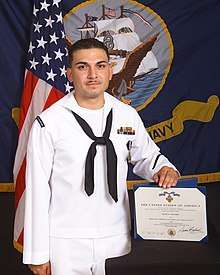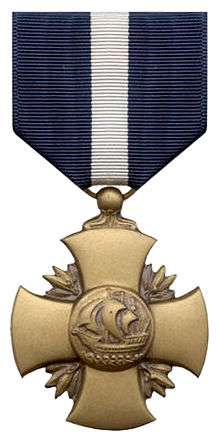Luis Fonseca (United States Navy)
Luis E. Fonseca, Jr. (born 1980) is a United States Navy sailor. He is a hospital corpsman who was awarded the Navy Cross for his heroic actions during the Battle of Nasiriyah, on March 23, 2003. This was one of the first major battles in the opening stages of the Iraq War.
Luis Fonseca | |
|---|---|
 Fonseca with his Navy Cross award in 2004 | |
| Nickname(s) | "Doc Speedy" |
| Born | 1980 (age 39–40) Frankfurt, West Germany (now Frankfurt, Germany) |
| Allegiance | |
| Service/ | |
| Years of service | 1999–present |
| Rank | |
| Unit | 2nd Assault Amphibian Battalion 1st Battalion, 2nd Marines (1/2) 2nd Battalion, 8th Marines (2/8) Naval Hospital Camp Lejeune USS Bataan (LHD-5) |
| Battles/wars | Iraq War |
| Awards | |
| Spouse(s) | Christina Fonseca |
| Relations | Children (oldest to youngest): Chrystian, Angel, Jadelynn, Brycen, Fenix. |
| Other work | Legion of Valor |
Early life and education
Fonseca's father was stationed in Frankfurt, West Germany when Luis was born in 1980, his father later retired from the United States Army in Fayetteville in Cumberland County, North Carolina where Fonseca was raised with his father, mother, and older sister.[1][2]
Although Fonseca dropped out of high school, he did not let that stop him from pursuing a career in medicine and continuing his education. Fonseca graduated with his associate degree in June 2015 and is currently working on his prerequisites for PA school.[3]
Career

Fonseca initially wanted to enlist in the U.S. Marine Corps, but decided otherwise when he discovered that they did not have a dedicated medical occupational specialty. He ultimately ended up enlisting in the U.S. Navy as a hospital corpsman in 1999, and graduated from Recruit Training Command Great Lakes in September of that year. Fonseca graduated from Hospital Corpsman "A" School in February 2000, and graduated from Field Medical Service School in May 2000. He was assigned to the 2nd Assault Amphibian Battalion from May 2000 to August 2003, and to 2nd Battalion, 8th Marines (2/8), from August 2003 to July 2004. Afterwards, he served at Naval Hospital Camp Lejeune from July 2004 until May 2007, and later, with the amphibious assault ship USS Bataan.[3]
Fonseca served in the War in Afghanistan from November 2003 to May 2004. He returned home from the Iraq War and was awarded the Navy Cross. However, the stress of the war, combined with the fame and attention received as a result of being awarded the medal, led Fonseca to alcohol abuse. During this time, Fonseca also dealt with post-traumatic stress disorder. Ultimately, his commanders intervened, and Fonseca received assistance in the form of counseling and medication, making a recovery possible. In many cases, among returning military veterans during wartime, psychological effects have much longer-lasting effects compared to physical wounds.[3][4][5]
Navy Cross citation

"For conspicuous gallantry and intrepidity in action against the enemy while serving as Corpsman, Amphibious Assault Vehicle Platoon, Company C., First Battalion, Second Marines, Regimental Combat Team 2 on 23 March 2003. During Company C's assault and seizure of the Saddam Canal Bridge, an amphibious assault vehicle was struck by a rocket-propelled grenade inflicting five casualties. Without concern for his own safety, Hospitalman Apprentice Fonseca braved small arms, machine gun, and intense rocket propelled grenade fire to evacuate the wounded Marines from the burning amphibious assault vehicle and tend to their wounds. He established a casualty collection point inside the unit's medical evacuation amphibious assault vehicle, calmly and methodically stabilizing two casualties with lower limb amputations by applying tourniquets and administering morphine. He continued to treat and care for the wounded awaiting evacuation until his vehicle was rendered immobile by enemy direct and indirect fire. Under a wall of enemy machine gun fire, he directed the movement of four casualties from the damaged vehicle by organizing litter teams from available Marines. He personally carried one critically wounded Marine over open ground to another vehicle. Following a deadly artillery barrage, Hospitalman Apprentice Fonseca again exposed himself to enemy fire to treat Marines wounded along the perimeter. Returning to the casualty evacuation amphibious assault vehicle, he accompanied his casualties South through the city to a Battalion Aid Station. After briefing medical personnel on the status of his patients, Hospitalman Apprentice Fonseca returned North through the city to Company C's lines and to his fellow Marines that had been wounded in his absence. His timely and effective care undoubtedly saved the lives of numerous casualties. Hospitalman Apprentice Fonseca's actions reflected great credit upon himself and upheld the highest traditions to the Marine Corps and the United States Naval Service."[6]
Awards and decorations
 |
 | ||
- 5 gold service stripes.
Gallery
 Fonseca in August 2004, during his tenure as a Hospitalman Apprentice (HA).
Fonseca in August 2004, during his tenure as a Hospitalman Apprentice (HA).- Fonseca in June 2012, after his rate advancement ceremony to Petty Officer First Class (PO1).
_Luis_Fonseca%2C_Jr.%2C_USN.png) Fonseca during his tenure as a Hospital Corpsman Second Class
Fonseca during his tenure as a Hospital Corpsman Second Class
References
- "HM2 Luis Fonseca - Heroes in the War on Terror". OurMilitaryHeroes. U.S. Department of Defense. Retrieved 2012-12-15.
- "Valor awards for Luis E. Fonseca Military Times Hall of Valor". MilitaryTimes. Gannett Government Media Corporation. Retrieved 2012-12-15.
- "HM2 Luis Fonseca". U.S. Navy Voices. TogetherWeServed. 2010. Retrieved September 8, 2013.
- Gregg Zoroya and Oren Odell (2006-11-10). "Medals carry great weight, as do men who wear them". USA TODAY. Retrieved 2012-01-24.
- Lisa Burgess (2005-06-14). "I started patching them up real quick". Stars and Stripes. Retrieved 2012-01-24.
- HomeOfHeroes.com. "Navy Cross Citation for Luis Fonseca". HomeOfHeroes.com. Retrieved 2012-01-24.
Further reading
- James E. Wise; Scott Baron (2007). The Navy Cross: Extraordinary Heroism in Iraq, Afghanistan and Other Conflicts. Naval Institute Press. pp. 29–35. ISBN 1-59114-945-2.
External links
| Wikimedia Commons has media related to Luis E. Fonseca, Jr.. |
- Luis Fonseca at U.S. Navy Voices